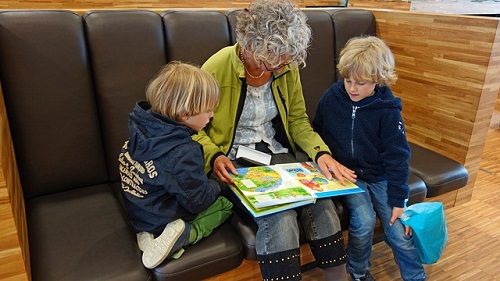Are you curious about when grandparents can gain custody of their grandchildren? It’s a complex issue, but let’s explore the topic together! In many cases, grandparents may seek custody of their grandchildren when the biological parents are unable or unfit to care for the child. Here are some common scenarios in which a grandparent may seek custody:
Parental incapacity or unfitness
In situations where biological parents are deemed incapable or unsuitable to provide appropriate care and support for their child due to factors such as substance abuse, mental illness, neglect or abuse; it is within the court’s purview to grant custody to a grandparent. Such a decision is made after careful consideration of the child’s best interests and the ability of the grandparent to provide a safe and nurturing environment for the child. It is important to note that the court takes into account all relevant factors before arriving at a decision, and that this process is guided by the overall objective of ensuring the child’s welfare and well-being.
Child endangerment:
When a child is facing danger or harm while under the care of their biological parents, grandparents can confidently seek custody to ensure the child’s safety and well-being. Through the court system, grandparents can present compelling evidence and arguments demonstrating their capacity to provide a stable and nurturing environment for the child. The court will consider various factors, such as the child’s relationship with their biological parents and grandparents, the stability of each household, and the ability of each party to meet the child’s physical, emotional, and educational needs. Ultimately, the court’s goal is to place the child in the best possible environment for their growth and development, prioritizing their welfare above all else.
Parental death:
In instances where one or both of the parents of a child have passed away, grandparents may choose to seek custody of the child as a means of providing a stable and loving home for them. This can be a complex and emotionally charged process, as it involves navigating legal procedures and demonstrating that the child’s best interests are being taken into account. Grandparents seeking custody will need to demonstrate that they can provide a safe and nurturing environment for the child and that they are capable of meeting the child’s physical, emotional, and educational needs. In some cases, other family members or interested parties may contest the grandparents’ bid for custody, further complicating the situation. Despite the challenges, seeking custody can be a worthwhile endeavor for grandparents who are committed to providing a stable and loving home for their grandchild.
Consent of parents:
In some cases, biological parents may decide to voluntarily transfer custody of their child to the child’s grandparents. This decision is based on the belief that such an arrangement is in the best interest of the child. Such a decision could be made for various reasons, including but not limited to financial challenges, marital issues, or health problems. The transfer of custody provides the grandparents with the legal authority to make important decisions regarding the child’s welfare, including education, healthcare, and general upbringing. It is important to note that such a decision is voluntary and should be made with the best interest of the child in mind.
De facto custodian status:
In certain jurisdictions, some laws acknowledge the important role that grandparents can play in a child’s life. These laws recognize a grandparent as a “de facto custodian” if they have been the primary caregiver and provider for the child for an extended period. This extended period is usually defined as a year or more. This status gives grandparents the legal standing to seek custody of the child in situations where the biological parents are unable or unwilling to provide adequate care. It is important to note that the process of seeking custody can be complex and requires the assistance of an experienced family law attorney.
Abandonment:
If the biological parents have abandoned the child for an extended period and have not maintained contact or support, grandparents may be able to seek custody based on abandonment. The term “abandonment” typically refers to a situation where a parent has failed to maintain a relationship with their child or has neglected their parental responsibilities towards the child, such as providing financial support or care. If the grandparents can prove that the biological parents have abandoned the child, they may be granted custody by a court.

Challenges in Gaining Grandchild Custody
However, gaining grandchild custody can be a complex and challenging process, often fraught with legal, emotional, and logistical hurdles. Some of these challenges may include:
Legal Complexity and Custody Laws:
Custody laws vary significantly from one jurisdiction to another, adding layers of complexity to the process. In many cases, grandparents may need to navigate through family court systems, which can be daunting and time-consuming. Moreover, some jurisdictions prioritize parental rights over grandparental rights, making it challenging for grandparents to obtain custody unless they can prove that the parents are unfit or unable to provide a safe environment for the child. Understanding the legal framework and requirements in a specific jurisdiction is crucial but can be overwhelming without legal expertise.
Parental Opposition and Family Conflict:
Another significant challenge in gaining grandchild custody is parental opposition and potential family conflict. In cases where the parents are alive and involved in the child’s life, they may resist granting custody to the grandparents, viewing it as a threat to their parental authority or as an indication of their inadequacy as caregivers. This can escalate into legal battles and strained family relationships, causing emotional distress for both the child and the grandparents. Navigating these dynamics while trying to maintain a supportive relationship with the child and their parents can be emotionally draining and complicated.
Financial and Emotional Resources:
Pursuing custody of a grandchild often requires significant financial and emotional resources. Legal fees, court costs, and other related expenses can quickly accumulate, particularly if the case becomes protracted or contentious. Additionally, grandparents may need to demonstrate their ability to provide a stable and nurturing environment for the child, which may involve addressing housing, education, healthcare, and other essential needs. Balancing these financial responsibilities while managing the emotional toll of the custody battle can be overwhelming, especially for grandparents who may already be facing retirement or other life challenges.

Conclusion
It’s crucial to bear in mind that the regulations governing grandparent custody can vary significantly depending on the geographic location. Therefore, it is highly advisable to consult with a family law attorney who is familiar with the laws and customs of your area for personalized guidance.
In addition, it is worth noting that the court always prioritizes the child’s well-being when determining custody agreements. The court takes into account factors such as the child’s age, health, and emotional needs, as well as the grandparents’ capacity to provide a secure and stable environment for the child.
In conclusion, gaining grandchild custody presents various challenges, including navigating complex legal systems, managing parental opposition and family conflict, and addressing financial and emotional resources. Overcoming these obstacles often requires careful planning, perseverance, and sometimes professional legal and emotional support.

